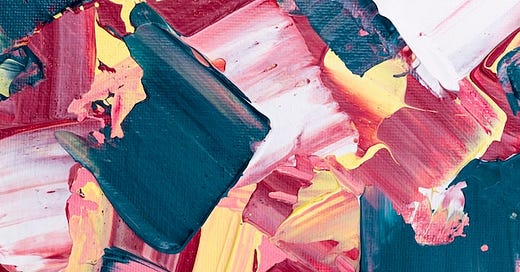The pain, pleasure, and pressure of the human truth
Some introspection on mental health and writing and how they intertwine
TW: I discuss some of my experiences regarding mental health, such as anxiety or suicidal feelings in this issue. If you feel you are in need of mental health assistance, please contact the National Center for Mental Health Crisis: 0966-351-4518.
Please reach out and seek help. And please know that you are valued and loved and the world is a better place with you in it!
***
Photo from Freepik
What is it that makes writing mean something to someone?
What kind of copy stops the infinite scroll? Keeps a reader hooked? Or makes someone think about those words days or even years after they first read them?
It’s irrevocably true insights. Human truths.
Just think of the last time you shared a Morgan Harper Nichols photo quote on your Instagram story. Or those Taylor Swift or Mayday Parade lyrics you’d use as Facebook status updates years ago. Or the last time you shared those “Batang 90s” memes with your cousins. Simply put in Filipino terms, it’s all about the hugot.
These creations resonated with you then (and maybe even now) because of the pleasure or pain they captured.
And in a nutshell, I think that’s what meaningful writing really is. Articulating the nuances and fleeting moments of human experiences in a way that makes others say “That’s EXACTLY how I feel!”
***
I’ve been writing since I was 8 years old.
And looking back, whether it was the short stories of grade school, those dramatic romance poems I shared with the subject of the poems, my high school crush, the radio program scripts I wrote in college, or the pitch decks and content I write today…there has always been an element of looking for those human truths.
That meant a lot of introspection. A lot of vulnerability. Growing up, it meant growing closer to people in ways others my age couldn’t understand.
It meant trying to understand people and be understood by people - some of whom didn’t have my best interests at heart. Some of whom were kids, just like me, who were just navigating the world, too. (But I don’t know if that excuses the bullying and confrontations and gossiping I was subjected to.)
My predisposition to writing meant becoming a bit of a weirdo and a whole lotta nerd, thanks to being a bookworm and a favorite among my English teachers.
Growing as a writer meant having to embrace being emotional - something that either drew people in or repelled those who couldn’t understand.
It also meant becoming increasingly familiar with my own feelings as I wrote in my journal, or translated them into stories and poems. And that included becoming in touch with the darker feelings of isolation, anxiety, and suicidal thoughts.
***
To their credit, I did have parents who cared, it’s just that they had their own demons, and they didn’t have the resources parents have nowadays when it comes to learning about mental health. And a lot of their demons affected me too, yet I couldn’t hash it all out without inflicting another cycle of pain.
I did have teachers who cared, but perhaps it was (or still is?) scarier for teens back then to have their teachers talk to their parents. As a 10-year-old, I didn’t exactly see report card day as a day for getting help from my folks - more as a day when teachers “told on me.”
And I did have friends who cared. Time and trials told me who the genuine ones were. But the process of weeding out the false and discovering the true was hell on earth for me.
***
Now, at 28 years old, I think I have a satisfyingly diverse pool of memories and experiences to draw insights from when I need to write - for work, for my personal projects, for therapy assignments.
I know my feelings well enough to be able to articulate them and discuss them at length with anyone who’ll listen. Some of the pain is far back enough for me to be able to look at it with less of a pinch in my heart.
And honestly? All of it helps me write.
Just like the human truths we copywriters look for, I can’t deny that pain has helped me write.
But is being able to do what I do - pretty well, I think - worth all that pain?
I honestly don’t know.
Could I have learned about these experiences some other way? From the safety of a news article, a documentary, a stranger’s story? Would it be as impactful, if felt third-hand?
I honestly don’t know.
Because I personally think that pain, more than pleasure or the pressure (of deadlines) fuels art.
Even fans of the brilliant Taylor Swift and Adele have, time and time again, worried about how these artists’ romantic happiness could impact their careers, built on songs written by broken hearts. (Imagine that, worrying about an album while your favorite artist is deeply in love!)
And even those Swifties in happy relationships “imagine” themselves in pain just to fully enjoy her sadder songs!
The human mind and heart are fascinating, and sometimes, quite terrifying.
***
And once again, I end a newsletter with no hint of an answer - just questions, and food for thought.
Does pain resonate more than pleasure, whether you’re creating or consuming art?
Could you be the writer (or artist) you are today, if you didn’t have a single experience of pain in your life?
And what would a world filled with people like that be like?





